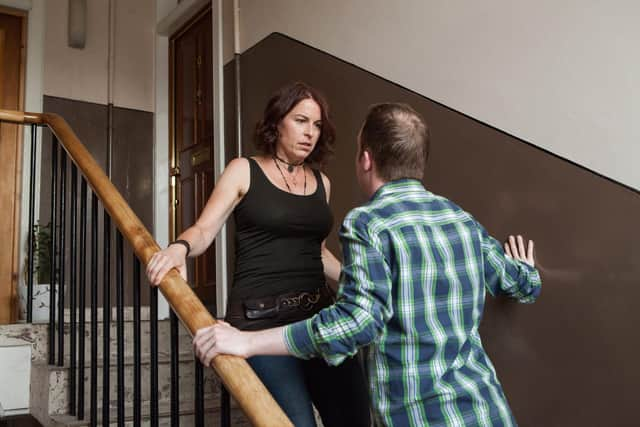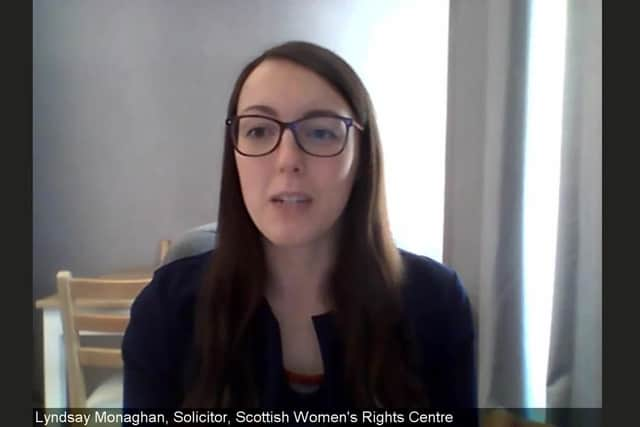Experts and campaigners warn plight of domestic abuse victims and their children ignored in Scottish courts
Despite clear legal requirements to consider domestic abuse in child contact decisions, a solicitor working with victims has said it happens “very rarely” – putting children in harm’s way and leaving victims trapped in drawn-out court battles.
The Scotsman can reveal research from a Scottish university has also found the majority of victims – mainly women – are told by solicitors not to disclose domestic abuse in child contact disputes, even if their abuser was convicted.


Advertisement
Hide AdAdvertisement
Hide AdWomen’s rights groups have issued a plea for an urgent overhaul in the handling of contact disputes, claiming civil courts are breaching human rights of victims and their children by not upholding legal protections.
In Scotland, the Domestic Abuse Act, which criminalises coercive control for the first time, came into force in April 2019 and was hailed as ‘gold standard’ legislation by Scottish Women’s Aid and other groups.
This March also saw the passing of legislation that will give more powers to police and courts to protect people at risk of domestic abuse.
But experts warn misogyny and systemic failure to understand domestic abuse in civil courts is leading to a dangerous 'pro-contact' approach.


It comes as victims support organisations have voiced fears about the lasting impact that delays to court trials is having on victims, witnesses and their families at the time when they are most vulnerable.
Professor Richard Whitecross, head of law at Edinburgh Napier University, said: “Across a number of studies I have done, the majority of women have been told by their lawyer not to mention domestic abuse.
"That underplays the long-term damage of domestic abuse. It’s often advised that it’s is a ‘private family matter’ or it’s dismissed as ‘historical’.
"We need an evolution in thinking. Sheriffs will have children’s best interests at heart, but there is a lack of understanding.”
Advertisement
Hide AdAdvertisement
Hide Ad“There’s a standard approach based on principle that both parents should be in the life of the child, respecting the UNCRC. But it comes with this sense that, so the father did that in the past, but that’s separate to being a Dad now and he’s an ‘OK Dad’.
"It’s a dangerous assumption we see repeated in these contact decisions.”
Prof Whitecross will publish research this summer on the impact of child welfare reporters in domestic abuse cases, often solicitors, who are appointed by the courts to prepare reports in cases involving child contact.
The investigation builds on a series of research studies on child contact, civil proceedings and domestic abuse in Scotland
The Scottish Government is consulting on proposal allowing ministers to establish a register of child welfare reporters, ensuring they would be trained in domestic abuse and coercive control.
Prof Whitecross says the plans don’t go far enough.
"The register could improve practice, but that will take years,” he said.
"The system needs a fundamental rethink. Judges choose what courses they go on, training is not mandatory. And this is a much wider social issue.
"You could say there is a culture of misogyny. Unless there is a shift in perspectives, nothing will change.
Advertisement
Hide AdAdvertisement
Hide Ad"Domestic abuse has to be relevant in these cases now. Victims are often immobilised by fear. Many don’t recognise they are victims and it’s a much higher percentage of women than we have ever realised.”
There were 30,718 domestic abuse charges reported in Scotland in 2019/20, the highest number since 2015/16.
But while the vast majority – more than 90 per cent – proceed to criminal court, these proceedings are not linked up with civil cases involving child contact.
Women’s rights groups say this gap needs to addressed to prevent abusers dominating their victims through courts.
Lyndsay Monaghan, associate solicitor at the Scottish Women’s Rights Centre, said: “The Domestic Abuse Scotland Act makes it even clearer that domestic abuse should be considered.
"We very rarely see that happen in practice, so legislation is not being utilised in the correct way.
"The welfare of the child is paramount and if there is a claim of domestic abuse, that should be at the forefront. It’s on the solicitor to highlight abuse and any concurrent alleged criminal offences to the sheriff.
“We hear of contact being granted in cases where domestic abuse is ongoing and even when the abuse is alleged against the children, yet contact still proceeds.
Advertisement
Hide AdAdvertisement
Hide Ad“Overwhelmingly, we hear that contact is used by fathers to continue to perpetrate abuse by raising court proceedings and continuing them unreasonably. We see this issue daily in calls to our helpline. The majority of calls are related to domestic abuse.”
The UK Government is carrying out a review of family courts in England and Wales in response to campaign groups like Women’s Aid and concerns about pushing contact “at all costs”.
Campaigners say they don’t want to see a blanket ban for anyone with a history of domestic abuse – but stressed an immediate review of the system is needed.
Scottish Women’s Aid says more stringent assessments need to be mandatory in these cases to force perpetrators of domestic abuse to lose contact rights until they can prove they are no longer a danger.
Dr Marsha Scott, chief executive of Scottish Women’s Aid, said: “We hear of violations of human rights every day in court in Scotland for victims of domestic abuse and their children.
"I know of cases where the woman or child has been killed in the first act of physical violence in a long history of coercive control. We don’t believe kids should never have contact with their fathers, but why order it if the contact is not safe?
"Assessments done by agencies would be best in these cases, but so many in court roll their eyes at this, as they consider expert organisations as biased in favour of mothers.
"It’s hard to believe the hoops that the system will go through to convince itself that kids shouldn’t be allowed to protect themselves from a relationship with an abuser.
Advertisement
Hide AdAdvertisement
Hide Ad"Training is essential, but doesn't tell us about changes in practice. While there is no panacea we have the right elements for change in the landscape under current legislation.
"What we need now is a more concerted effort, a plan and an assessment of how it’s working. The justice system needs to be accountable for upholding the human rights of women and children.”
A Judicial Office for Scotland spokesperson said: “When making a decision, judges listen carefully to what is presented to them in court and take into account the law that applies and the unique facts and circumstances of each case they deal with.
“The Judicial Institute for Scotland has provided comprehensive training to Scottish judges on domestic abuse, most recently in relation to the Domestic Abuse Scotland Act 2018 (DASA)."
How one woman was impacted by domestic violence
Emma’s relationship with her ex-husband quickly became controlling and the physical violence escalated when she was pregnant with their son David.
She said: “He’d get violent and then pull me back in, making me feel he was sorry and it could all be OK.
“Once he smashed up stuff and a piece of glass hit my son. He locked me outside for hours while my baby was left crying. He could be so charming, but he’d turn into a monster.
“I woke one night and he had cut the sheets around me. He held up a hammer to my head and said ‘if you think this is bad, wait until tomorrow’.
Advertisement
Hide AdAdvertisement
Hide Ad"When he was asleep I grabbed by passport, my son and took dirty clothes out of the laundry.”
Her ex pleaded guilty and was charged with assault.
For years he had unsupervised contact with his son. But after one incident when David was terrified of his father, he requested for the contact to be his decision. Emma lodged a minute requesting a contact order change.
In court she was advised not to disclose the abuse or her ex-husband’s charge. She is now pursuing a legal complaint against the barrister who has asked for leave to appeal.
“The judge ordered my son to reunify with his father without investigating the evidence of abuse,” she said.
"He said ‘don’t tell me, it will influence my decision’. The court reporter covered it up. I was repeatedly asked if I was making my son resist contact. It was horrifying.”
“My son felt pressured to agree to see his Dad. A court mediator told me the welfare reporters instructions to her were ‘not to let up’.
"My son started self-harming and became suicidal. The system breaks you down, it’s cruel and needs to better support victims. To see my son suffer was unbearable.”
